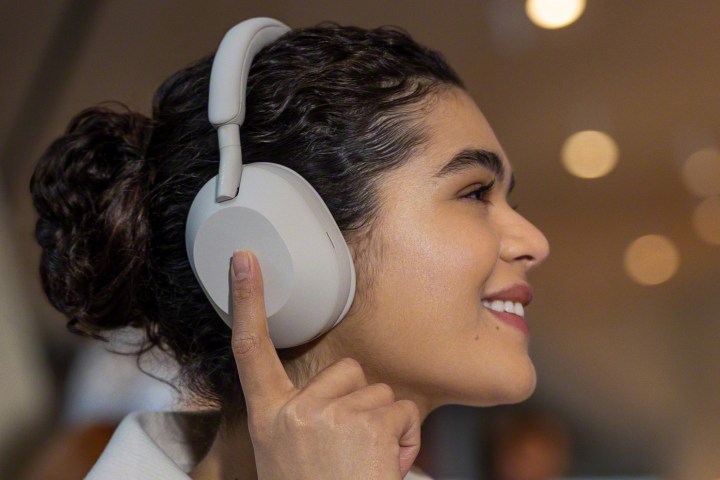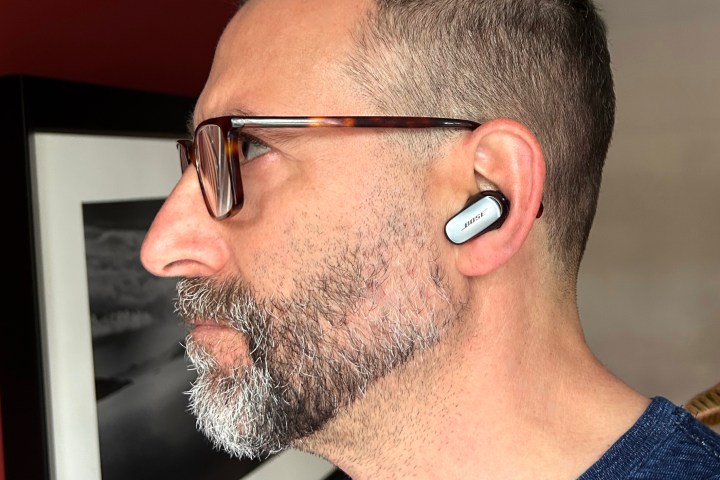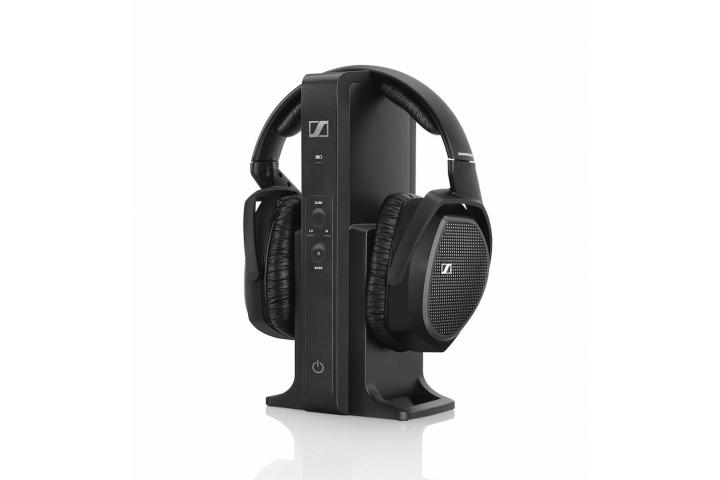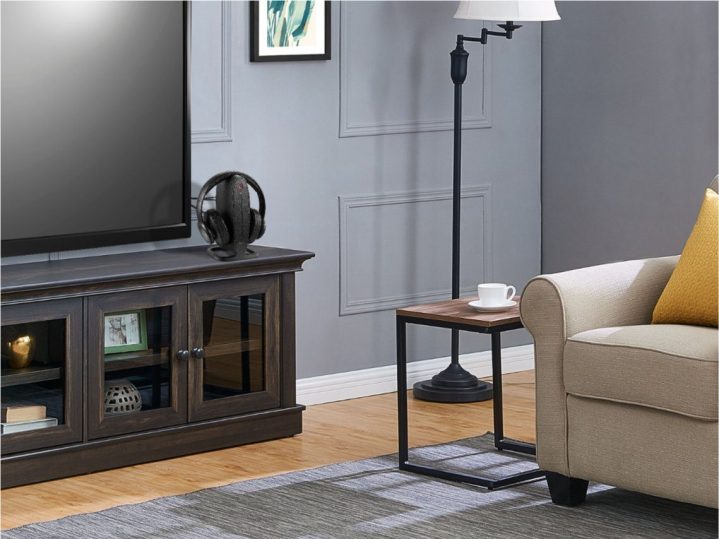If you want to watch TV but have a busy household, a baby, or family members that need to quietly study for some dedicated hours each night, you know that it can be frustrating. But if you’ve been paying attention to music-lovers, you’ll notice that they have a very good option for listening to things without disturbing (or being disturbed by) others: Headphones. And, as it so happens, you can connect headphones to TVs just as you can your phone.
The main method to do so is via Bluetooth, which is going to be applicable for nearly any of the best TVs or their connected consoles in the current year. We’ll also look at RF (radio frequency) headphones, which provide an alternative for when Bluetooth just won’t work or you can’t connect the TV itself directly to your headphones and want to use a more traditional broadcast method, such as getting your entertainment from one of the best TV antennas. For a true cinephile / audiophile experience, you’ll naturally want to try wired headphones, but the following wireless headphones are top-notch and will give you an excellent way to interact with your TV in an otherwise difficult situation.
The best wireless headphones for TV in 2024
- Buy the for the best overall wireless headphones that will also work great on TV.
- Buy the if your home is especially noisy and you want a slight boost in noise cancelling power.
- Buy the for a budget pair of Bluetooth headphones that will still work phenomenally.
- Buy the if you prefer earbuds for your TV listening.
- Buy the for the best overall RF headphones for TV.
- The are a great alternative RF headphones pick.
Sony WH-1000XM5
Best for most people

| Pros | Cons |
| Fantastic noise cancelling | Fold-flat, but don’t fold up |
| Touch controls make for easy viewing | |
| Hi-res compatible |
Sony’s WH-1000XM5 are the best headphones, flat out. And, as such, since they are compatible with TVs, they’re also going to be one of the best pairs of headphones for your TV. The sound quality is high from the start and you can engage the LDAC codec with compatible devices. When the noise cancelling is used at the highest levels (it is adjustable) the world around you becomes nearly silent, with even annoyances like loud fans dropping to nearly perfect silence, with or without additional sound being played through the earcups. If you’ve used other noise-cancelling headphones and been unimpressed, these are different, and can make being a solo TV watcher enjoyable again. As mentioned in our Sony WH-1000XM5 review, the transparency mode is also quite fantastic, with a special mode that enhances voices specifically.
Furthermore, changing to this mode is quick and easy. The reasoning is due to the incredibly responsive controls on the body of the WH-1000XM5, which will help you not only enjoy the sounds of what you’re watching more, but also help you interact with the media itself to some degree. Surprisingly, there are only two buttons on the device; a power button that can also be tapped to approximate the battery percentage remaining of the WH-1000XM5’s quite impressive battery life and another button to engage the active noise cancellation (ANC). The rest is all touch controls. For TV viewers, the most likely things you’ll use are a full hand over the right earcup to engage the aforementioned transparency mode (useful whether ANC is on or off) and a rapid double-tapping of the finger to pause and resume content. This pausing and unpausing feature is so fast and handy, you’ll find yourself wanting to wear the WH-1000XM5 for TV viewing even in an empty house.
There are few things not to love about these headphones. Average human users are not going to find delay issues in content or any syncing issues. Throughout our guidance on the WH-1000XM5 we’ve used the way they don’t fold up as a ‘con’ for the headphones, but ultimately the volume of the headphones doesn’t change either way and the WH-1000XM5 come with a fantastic case. Perhaps for long viewing sessions, you’ll want to adjust the headband to be slightly looser as time worn progresses for extra comfort, but this is also no issue.
| Key Specifications | |
| Connection type | Bluetooth 5.2 |
| Weight | 0.55 pounds |
| Battery life | 30 hours |
Bose QuietComfort Ultra Headphones
Best for the noisiest environments

| Pros | Cons |
| Best-in-class noise canceling | ANC can’t be turned off |
| Great comfort for the long term | |
| Features Qualcomm’s Snapdragon Sound | |
| Spatial audio |
If you live in a truly noisy environment, there is a new “King” of headphones for the audiophobes amongst us. Bose’s QuietComfort Ultra Headphones are the best noise-cancelling headphones of the year, beating both the AirPods Max and WH-1000XM5 in the ability to keep things quiet. We also like how you can choose which ANC mode you want — including custom-defined ones — via gesture control on the headphones. That can mean starting your TV session in one mode at 2:30, then using a less intense mode when your kids come home from school so you can still keep an ear on them if they call for help. No phone fiddling required.
Of course, superb ANC isn’t the only thing that makes Bose’s leading noise cancellation headphones worth buying for your TV viewing. First of all, once you go through the process of getting them adjusted, you’ll likely find them in a “just right” spot. Our Bose QuietComfort Ultra Headphones review perhaps states it better, informing us that the headphones have a “clamping force that’s just strong enough to keep everything where it should be, and no more.” Next, you’ll appreciate the Qualcomm Snapdragon Sound, including aptX for low latency connections, should your TV allow for it. Finally, Bose’s unique spatial audio system, if employed, will give you the sense that you are hearing from stereo speakers somewhat to the front and above you. If you turn your head, the ear turning away — in real time — will receive less and less noise input. It’s a truly remarkable feature that’s done well, not like a gimmick. Should you be the TV watcher that likes just listening and popping your head up from time to time to watch, you may feel perfectly fine turning the feature off.
| Key Specifications | |
| Connection type | Bluetooth 5.3 |
| Weight | 0.56 pounds |
| Battery life | 24 hours |
1More SonoFlow
Best budget

| Pros | Cons |
| Great value for the price | No aptX |
| Exceptional battery longevity | |
| LDAC sound on a budget |
While keeping ourselves entertained and happy is important, it is equally justifiable to put your foot down on expenditures when it comes to TV viewing. If you want cheap Bluetooth headphones, you don’t have to completely sacrifice quality in the current year. The 1More SonoFlow even have at least one advantage over a lot of the more expensive headphones on the list, a super high battery life spanning up to 70 hours if you never turn on the ANC (and 50, even if you do). Just five minutes of charging — barely enough time to choose which of today’s best movies to watch — will give you approximately five hours of usage time. Be sure to check out our full 1More SonoFlow review for the minutiae of the headphones’ battery life, one of their more compelling features.
The 1More SonoFlow have access to the LDAC codec (but no aptX), ANC and transparency, and EQ controls, just like more expensive headphones would have. What’s perhaps more impressive is the things that they avoid having, which you might expect at this price range. There’s no awkward, proprietary charging cable (or, nearly as bad, a micro-USB one) as you can charge via USB-C. Similarly, they aren’t plagued by a stiff, clunky body and an overly snug fit that will leave your ears burning.
| Key Specifications | |
| Connection type | Bluetooth 5.0 |
| Weight | 0.55 pounds |
| Battery life | 70 hours |
Bose QuietComfort Ultra Earbuds
Best earbuds

| Pros | Cons |
| Very comfortable | No Bluetooth Multipoint |
| Features Qualcomm’s Snapdragon Sound | |
| Excellent spatial audio |
If you don’t want a clunky over-the-head pair of headphones keeping you immobile, consider getting a pair of the best earbuds. It may sound a bit ridiculous, but the Bose QuietComfort Ultra Earbuds are truly like a shrunk down version of the Bose QuietComfort Ultra Headphones. At least in a lot of ways that make them great for TV watching. They’ve got that same Qualcomm Snapdragon Sound package for hi-res, low latency audio with aptX and the cool spatial audio features that make the headphones tick. It’s just now all in earbud form. And overall, the concept translates quite well, with our Bose QuietComfort Ultra Earbuds review stating that they are quite comfortable to wear, even for extended periods, and stayed in better for the long haul than other popular earbuds like the AirPods Pro. This means less immersion breaking from jamming loose, ear-canal-stretching buds and more time enjoying your programming.
| Key Specifications | |
| Connection type | Bluetooth 5.3 |
| Weight | 0.01 pounds |
| Battery life | 6 hours (+18 in case) |
Sennheiser RS 175 RF
Best RF headphones

| Pros | Cons |
| 330 foot line of sight range | Large earpads |
| Clear, quick sound transmission | |
| Great on-headphone controls |
Radio frequency (RF) headphones are the preferred type of wireless headphones for TV and movies for the more A / V inclined due to their ultra low latency. Developed by Sennheiser, a brand known for premium audio equipment in the home theater space, the RS 175 RF provide for very quick, low latency transmissions from a receiver to your headphones. Depending on what you’re watching, you may want to utilize the Bass Boost mode, and you’ll naturally want to utilize the built-in surround sound features.
When worn, the RS 175 RF should feel comfortable, with soft earpads, though we do find them to be a bit on the large side. On the outside, your fingers will find buttons with memorable textures to tap. These toggle the Surround Sound and Bass Boost modes as well as the volume. Ultimately, these headphones provide a super low latency wireless headphone experience for those that really care about this issue.
| Key Specifications | |
| Connection type | RF |
| Weight | 0.68 pounds |
| Battery life | 18 hours |
Insignia RF Wireless
Runner-up RF headphones

| Pros | Cons |
| Very affordable | Lower range |
| Low profile receiver | No ANC mode |
| RCA and Optical options |
The Insignia RF Wireless are a great runner-up pair of RF headphones. They come with a low profile receiver that will fade into your home audio equipment and a lower price tag to match, not too much more expensive than our budget pick for the category. The other thing that is lower for them is their reported range, down to about 33 feet — about the same as what you’ll comfortably get out of Bluetooth, but less than Sennheiser’s reported range. And, as far as flaws go, being as good as Bluetooth has to be one of the best.
Controlling the Insignia RF Wireless is really simple, with a power button and a plus / minus button for volume control. These headphones don’t have ANC, which we would have liked to have seen, but they still have the advantages of RF, which make everything super low latency and — by the nature of the receiver — make them compatible with any TV and any OS they can physically connect to.
| Key Specifications | |
| Connection type | RF |
| Weight | ~0.5 pounds |
| Battery life | 10 hours |
How we chose these wireless headphones for TV
In case it wasn’t obvious by now, we chose the preceding headphones in two primary categories: Bluetooth and RF. As it turns out, there are some slight differences in the considerations for each type of headphone when you want to connect them to a TV.
Bluetooth headphones
Whether you’re working with an Amazon Fire TV, Roku, or the PS5, you can likely connect via Bluetooth. You may not have tried yet, or even thought about it if you’re used to using your TV in the normal unabashed way, but Bluetooth headphones will almost certainly work on your TV. In fact, we largely recommend them.
Bluetooth headphones are the overwhelming winners of the wireless headphones market today. You can get a number of form factors for them, with everything from your standard over ear headphones to bone conduction headphones. Bluetooth equals flexibility.
It isn’t all peaches and cream, however, as there can be some latency issues. How much this affects you is as much about the tech of your headphones and TV as it is about your personal makeup. Older TVs and Bluetooth headphones may not have great codecs, which will introduce some latency. Newer Bluetooth models and aptX codecs, however, will greatly relieve this issue, though they may not be natively compatible with your TV.
Should you buy the modern Bluetooth headphones above and have a recent TV you’re unlikely to notice a problem at all except in rare cases, or if you play rhythm games with wireless headphones. If you’re highly into the A/V world, you may have developed a stronger sense of timing and latency, however, which is fine. But if you’re the typical consumer of wireless sound technology you’re going to be fine using Bluetooth headphones.
RF headphones
RF stands for “radio frequency” and the name alone explains half the tech. This style of wireless headphones, however, is known to be super low latency, with very few wireless headphones being able to compete. There’s also a pretty long line of sight range on many RF headphones models. At the same time, you may find quality worse in other ways, with the perks of aptX, LDAC, and/or AAC absent. The need for a receiver makes these headphones bulkier and harder to travel with, as well, but also makes it easier to connect to older TVs that lack Bluetooth support.
Other factors
Some other factors that will influence your experience come from the practicalities of headphones and, particularly, wireless headphones.
One obvious one is battery life, which is considerably more important for TV watching than it is for music listening. While the typical song won’t last much longer than three minutes, we all know that our favorite television shows have episodes of 30, 50, or more minutes and binge watching is a pretty easy habit to get into. As a result, longer battery lives are important. Aim for a battery life that is at least double your usual session length, so if you forget to charge your headphones, you still have another session available. Finally, if you decide to watch TV with earbuds, remember that the battery life is often described based on the life of a fully charged case and not necessarily the buds themselves.
The next consideration is weight, which again is considerably more important for the TV watcher than the music listener. And, again, it is for the same reason — heavy headphones worn for a short time are going to be less negatively impactful than those worn for lengthy TV bingeing marathons. We typically focused on over-the-ear headphones that were around half a pound for this article. A human head weighs about 11 pounds, meaning for each half pound of weight you add via headphones, you’re adding an extra ~4.5% of weight to your neck. For long sessions, less is definitely more.
This article is managed and created separately from the Digital Trends Editorial team.
Editors’ Recommendations
Services Marketplace – Listings, Bookings & Reviews